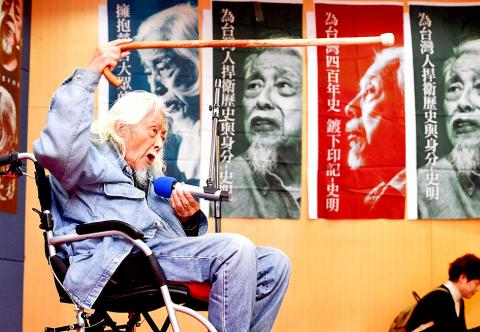The 98-year-old Marxist Taiwan independence advocate Su Beng (史明) yesterday urged Taiwanese to arm themselves with knowledge about pursuing independence, while saying that his assistance to president-elect Tsai Ing-wen (蔡英文) was strategic, during the launch of his memoir that he spent 20 years writing.
Arriving in a wheelchair at the book launch in Taipei, Su was greeted by hundreds of supporters who packed the room with applause and shouts of “wansui” (“live long”), while a long line of people queued up to wait for Su to sign books they had purchased.
Born to a wealthy family in Taipei’s Shilin District (士林) in 1918, Su obtained a degree in political economics from Waseda University in Tokyo, where he became a Marxist.

Photo: Lo pei-der, Taipei Times
In 1942, after graduating, Su traveled to China to join the communist revolution, only to be disappointed by the Chinese Communist Party’s brutality and ethnic manipulation, leading to his escape back to Taiwan in 1949.
However, his personal experience of years of living and fighting side-by-side with the Chinese communists turned Su into an advocate for Taiwanese independence.
Convinced that the then-authoritarian Chinese Nationalist Party (KMT) regime could only be overthrown by an armed revolution, Su was engaged in several bombing plots.
However, a failed attempt to assassinate then-president Chiang Kai-shek (蔣介石) led to Su’s exile to Japan.
In recent years, Su has campaigned for the Democratic Progressive Party (DPP), though he, as a Marxist and an advocate of Taiwanese independence, might not fully agree with the mainstream values of the party and of Tsai.
“Certainly, I have expended much effort on Tsai’s election campaign this time, because I wanted her to win,” Su told the audience. “Why so? There is only one reason: I do not want Taiwan to be taken over by China.”
“Socialism and revolutionary theories are not just about fighting. Sometimes, you have to compromise for Taiwan’s future, it is high-level strategy,” Su added.
He said that some people criticize him for what he was doing, accusing him of wanting to profit from Tsai’s election, despite having held his ideologies since when he was younger.
“Whoever makes such statements does not know how things are. I would only take it as a joke,” Su said.
He said that allowing the KMT to win is no different from allowing China to take over Taiwan, because the KMT and China are partners, adding that one key reason the KMT is still able to have an influence in Taiwan is because people do not study enough.
“I beg you to read more,” Su said.
“It is important to arm yourself with knowledge, remain loyal to your ideologies and stay in solidarity with your comrades,” he said.
DPP Secretary-General Joseph Wu (吳釗燮), DPP legislators Pasuya Yao (姚文智), Yu Mei-nu (尤美女) and Lee Ying-yuan (李應元), and New Power Party Legislator Freddy Lim (林昶佐) all attended the book launch.

Nipah virus infection is to be officially listed as a category 5 notifiable infectious disease in Taiwan in March, while clinical treatment guidelines are being formulated, the Centers for Disease Control (CDC) said yesterday. With Nipah infections being reported in other countries and considering its relatively high fatality rate, the centers on Jan. 16 announced that it would be listed as a notifiable infectious disease to bolster the nation’s systematic early warning system and increase public awareness, the CDC said. Bangladesh reported four fatal cases last year in separate districts, with three linked to raw date palm sap consumption, CDC Epidemic Intelligence

The manufacture of the remaining 28 M1A2T Abrams tanks Taiwan purchased from the US has recently been completed, and they are expected to be delivered within the next one to two months, a source said yesterday. The Ministry of National Defense is arranging cargo ships to transport the tanks to Taiwan as soon as possible, said the source, who is familiar with the matter. The estimated arrival time ranges from late this month to early next month, the source said. The 28 Abrams tanks make up the third and final batch of a total of 108 tanks, valued at about NT$40.5 billion

Two Taiwanese prosecutors were questioned by Chinese security personnel at their hotel during a trip to China’s Henan Province this month, the Mainland Affairs Council (MAC) said yesterday. The officers had personal information on the prosecutors, including “when they were assigned to their posts, their work locations and job titles,” MAC Deputy Minister and spokesman Liang Wen-chieh (梁文傑) said. On top of asking about their agencies and positions, the officers also questioned the prosecutors about the Cross-Strait Joint Crime-Fighting and Judicial Mutual Assistance Agreement, a pact that serves as the framework for Taiwan-China cooperation on combating crime and providing judicial assistance, Liang

Reports of Taiwanese going missing, being detained or interrogated, or having their personal liberties restricted in China increased about fourfold annually last year, the Mainland Affairs Council (MAC) said yesterday. Last year, 221 Taiwanese who traveled to China were reported missing, were detained and interrogated, or otherwise had their personal freedom restricted, up from 55 the previous year, the council said. Reopening group tours to China would be risky, as it would leave travelers with no way to seek help through official channels after Beijing shut down dialogue between the associations tasked with handling cross-strait tourism, the MAC said. Taipei’s Taiwan Strait Tourism